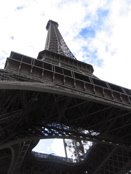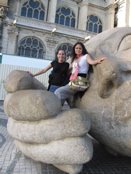
Fortunately, the teacher of my conférence was very knowledgeable and a clear speaker, so I figured I’d get more out of paying good attention during her section classes on Monday afternoons. All was well until we found out that at Sciences Po, completely unlike the system at UW, you receive two separate grades for each course – one full, five-credit note for the conférence and one full, five-credit note for the lecture.
This is when I began to get even more apprehensive – I’d been going on the assumption that even if I blew the final, I’d have my exposés, débats, fiches and participation credits to balance out my lack of familiarity with the French system of oral examination. Apparently not. Instead, the final that I took for L’union européenne et droit communautaire would yield a full grade – and since that grade was based on a mere 20 minutes of assessment, I could very easily fail a five-credit course.
Fears grew even sharper among the international students when we learned the full format of the exam. Apparently we were each to receive an appointment time for an individual exam. Upon arriving at the site, we’d be called into a room to receive our topic and 20 minutes of tense preparation. After that, we’d go into another room to present a 10 minute exposé – yes those oral presentations that I’ve been preparing and giving all semester (but with days and days of prep time).
Everyone in my conférence emailed each other their notes for the entire semester, but still I had no idea what to study. The only advice I’d received was the not very reassuring (and kind of insulting), “Make sure to tell them your American (or from the programme international) so they know to expect less from you.” I read through the European Union’s website to remind myself of the functioning of the Parliament, the Council and the Commission; the ratification dates and objectives of each treaty and the demographics of the EU. I read the BBC’s European news coverage from the past week, but other than that, I didn’t know what to do. So instead of studying efficiently, I sat around and worked on giving myself a hernia.
To add to everyone’s stress about this test, the fact that individual exams had to be scheduled for each of the 300-some students in the lecture meant that for weeks after Sciences Po had posted the final exam schedule online, we were still waiting to find out when our appointments would be. We finally received an email from the sécretariat, with an attachment that would supposedly give us our assigned times. Instead it was an Excel chart with the names and email addresses of all the international students in the course. After many frantic mass emails were sent out, someone from the class finally emailed the sécretariat back, and on Monday we finally received our appointments. Mine was today, February 7th at 14h40.
When I arrived at the ENA building, I found out from the line of classmates waiting in chairs outside of the preparation room that exams were running late. Like everyone else, I pulled out my class notes, but instead of reading them I stared blankly at the opposite wall, feeling my legs and hands twitch rhythmically.
I was finally called into the salle de préparation at about 15h10. I presented my student card to the woman overseeing the preparation time, signed my name on a contract stating that it was really me taking my exam, and she offered me two manila envelopes. From each envelope I was to select a strip of paper with an exposé topic on it, choose the one that interested me and return the other. My two options were l’élargissement et approfondissement de l’union européenne (the enlargement and deepening of the European Union) and le processus juridique entre l’union européenne et les états-membres (the legal processes between the European Union and its members).
I grabbed the slip about l’élargissement and ran to a desk as I was already down three minutes of prep time. Since this was supposed to be a formal presentation, not an interactive examination, I needed some kind of coherent structure, not to mention a problématique and a thesis, so I sketched out a sloppy outline and begin writing down everything I could remember from the week we’d discussed the EU’s enlargement and any other useful information I could come up with.

After twenty minutes of frantic scribbling, I was escorted into the actual examination chamber. I shook hands with the examiner, signed another contract and began to argue my thesis, that enlargement, rather than being a detriment and complication to the EU was a necessary project to not only unify Europe, but inspire a greater confidence in the power of the EU by not only its citizens, but outside countries as well.
While I’m not sure my actual presentation made any sort of sense organizationally, I had a thesis that, if not always being completely logically supported, was strong and I finished with a solid conclusion. I also pulled out some of my old International Studies written exam techniques and threw as many hard facts into the presentation as I possibly could – so that even if my on-the-spot French and exposé were at times shaky, the examiner would at least know that I’d attended class and knew what I was talking about. I hit a rough spot when I stumbled before remembering that the newest additions were Romania and Bulgaria, but hopefully made up for it by discussing the Bolkestein Directive and quoting Jacques Delors and Winston Churchill (when he called for a “United States of Europe”). I even found a way to work in the article I’d read just before my final, about the busting of a child pornography ring in Austria.
My examiner followed up with a few questions about the relationships between the Commission, Council and Parliament, and whether the judicial system of the EU could be compared to that of the U.S., which I answered adequately, if not brilliantly. My final question was something along the lines of “what do I want to be when I grow up,” so we spoke for a few minutes about journalism and whether or not there would be any demand for an American foreign correspondent whose specialty was French politics. We came to the conclusion that, as horrid and convoluted as it is for us non-Europeans to learn, my best bet is to stick with my studies of the European Union.
As I left the exam, my legs were shaking so badly I could barely walk up the stairs, but I managed to tell a German friend from my class that he’d be fine. When my muscles finally began to relax, I treated myself to a pastry from my boulangerie (whichever neighborhood boulangerie you shop at the most automatically becomes “yours” when you’re describing it to anyone else) and couldn’t think anything but “I survived!” Now all I have to do is make it through one more marathon night of studying for my three-hour essay test on contemporary French politics tomorrow morning.








3 comments:
AAAAHHHH!!! Please don't die. But do eat a lot of froot loops or chocolate or something. Congrats on being done!
Congratulations...it sounds like you pulled it off with typical-Halley style. =)
I'm very, very proud of you. Not only for your brilliant approach to a totally foreign approach to examinations, but for the magical way you shared the experience with your readers.
Post a Comment